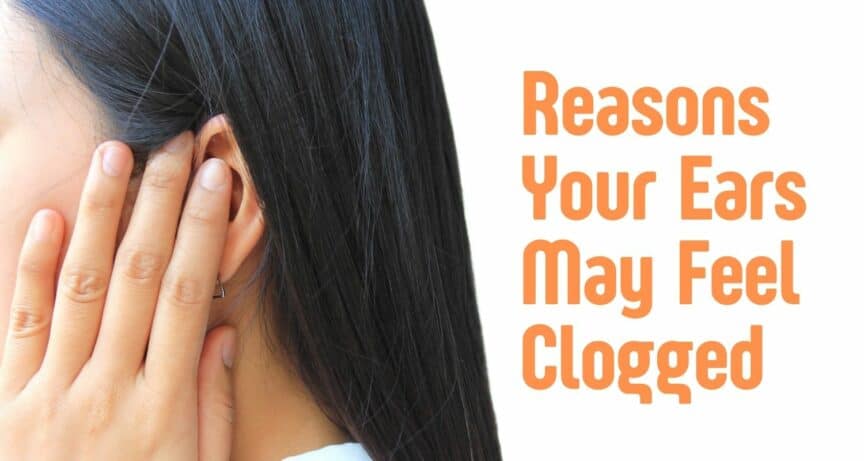Feeling like your ears are clogged is an unpleasant experience. Clogged ears can make hearing challenging as speech sounds muffled and unclear. Feeling a sense of fullness in the ears is typically a symptom of an underlying health issue that needs to be addressed. There are effective ways to alleviate this symptom which depends on what exactly is causing it. Common causes and treatment options include the following:
- Impacted Earwax. Earwax is part of the ears ecosystem. It is a natural substance made by the body to protect the ears. Also known as cerumen, this mixture consists of (oil and sweat) secretions from glands in the ear, dead skin cells as the skin in the ear regenerates, as well as dirt and other natural debris. Earwax is necessary for the ears and plays an important role in preventing infection. It traps bacteria which stops it from further interesting the ear. Earwax also helps keep the ears moisturized which prevents irritation and itchiness.
Earwax typically migrates out of the ears on its own. It is propelled from the ear canal, by jaw movements that occur while we talk and eat, to the outer opening of the ear where it flakes off. This is why we usually don’t have to always clean our ears. But earwax can accumulate in the ear and this is known as impacted earwax. This can happen because the earwax itself has become hardened and less mobile or; some people produce more earwax than others. Ear infections, a narrowed ear canal, and autoimmune disorders can also contribute to impacted earwax. This can contribute to ear-related issues and symptoms, including feeling like the ears, are clogged.
Earwax can be safely removed by a healthcare provider who has specific instruments designed to enter and examine the ears. It is important to avoid using cotton swabs at home which can push earwax further into the ears.
- Sinus Pressure. The sinuses are hollow spaces in the bones near the nose, eyes, and ears which are made up of tissue that make mucus. This mucus provides moisture to the nasal cavity and also helps filter the air we breathe by removing potentially hazardous bacteria and pollutants. SInus pressure can be experienced when the sinus cavities become filled with fluid which produces inflammation. This can be caused by a variety of factors including the common cold, allergens, the flu, etc. An estimated 35 million people experience this at least once a year.
Inflammation of the sinuses can also cause the Eustachian tubes, in the middle ear, to swell. The Eustachian tube is responsible for equalizing pressure within the ear so its inflammation can lead to the feeling that ears are clogged. Fortunately, sinus infections are typically temporary and clear on their own. People often take over-the-counter medications to alleviate sinus pressure and other symptoms.
- Ear Infections. Ear infections occur when bacteria or viruses infect and trap fluid that then accumulates behind the eardrum. This produces various symptoms including earaches, pain, drainage from the ear, trouble hearing, etc. Another symptom is feeling a sense of fullness in the ears. Ear infections can clear on their own but for severe symptoms or symptoms that persist, antibiotics may be needed.
- Noise Damage. Exposure to loud noise is one of the most common causes of noise-induced hearing loss. Hearing loss impacts over 48 million people and is the third most common chronic medical condition people experience today. Noise-induced hearing loss happens when hair cells in the inner ear are damaged by one-time or consistent absorption of loud sounds. These sensory cells play a critical role in how we absorb and process sound so when they lose density, dying over time, they are less able to help translate incoming sound waves. This produces various symptoms including tinnitus (ringing noise in the ears), difficulty hearing, and a sense of fullness in the ears. Hearing loss is assessed and diagnosed by a hearing healthcare specialist. The most common treatment is hearing aids which are electronic devices that help absorb and process sound, maximizing hearing capacity and alleviating symptoms.
- Inner Ear and Balance Disorders. The vestibular system is housed in the inner ear and is the sensory system that manages to maintain balance. When it is disrupted, it can contribute to vertigo and balance disorders that produce symptoms like clogged ears. Balance disorders can be caused by inner ear conditions, hearing loss, viral or bacterial infections, and certain medical conditions. There are various treatment options for inner ear and balance disorders, depending on the underlying cause. It can include medications, different therapies (canalith repositioning, balance, etc.), and hearing aids.
If your ears have felt clogged, it could be helpful to have your ears comprehensively examined. Call us to schedule an appointment today.

